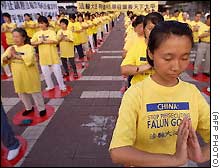August 27, 2002
(CNN) -- Beijing is going through a binge of the restoration of Cultural Revolution-era -- and feudalistic -- norms.
This is despite the fact that, 26 years after the Ten Years of Chaos (1966-76), the country seems irrevocably committed to market-oriented modernization.
While the Chinese economy is due shortly to overtake that of the U.K. and France -- and the country's top-flight scientists will soon be sending a man to the moon -- the remnants of feudalism are not only palpable but dictating political development.
Centuries-old dynastic traditions are making a last stand even as the Chinese Communist Party (CCP) gears up for its watershed 16th Congress slated for early November.
Listed below are the ten most disturbing manifestations of Cultural Revolution-style feudalism:
Black-box Political Maneuverings.
The Internet revolution notwithstanding, intrigues and back-stabbing in the CCP's cunning corridors are as opaque as ever.
Take President Jiang Zemin, who has refused to tell anybody whether he intends to continue being party general secretary after the 16th Congress.
Jiang was out of sight from August 2 to 18, and there are reports about health problems despite his still-robust public persona.
To discourage speculation about factional infighting, propaganda authorities have slapped on the media a list of up to 20 no-nos, including discussions of whether septuagenarian officials are fit for office.
A Mao-size Personality Cult.
Much of the Cultural Revolution consisted in fleshing out Chairman Mao's zuigao zhishi, or "instructions from the highest authority."
In the past few years, Jiang has tried to saturate the Chinese universe of discourse with one slogan after another, leading up to the "Theory of the Three Represents."
The theory, which says the party should represent advanced trends of society, is deemed a panacea for China's myriad ills -- as well as a "further development" of Marxism.
Despite late patriarch Deng Xiaoping's injunctions against personality cults, the president's ancestral home near the city of Yangzhou, Jiangsu Province has been turned into a museum with opulent, imperial airs.
The Aging Emperor's Syndrome.
Jiang's dynastic ambitions first became evident a couple years ago, when he ordered that his personal office would occupy an entire floor of the Army's new headquarters building.
Last year, he took delivery of the multi-million dollar -- and thoroughly bugged -- Air Force One.
It was quite evident the 76-year-old veteran did not go through these troubles for the benefit of his putative successor, Vice-President Hu Jintao.
His aides have given indirect encouragements to civilian and military cadres to write petitions saying Jiang must never retire because the nation cannot do without him.
The Syndrome of the Doomed Heirs-Apparent.
Mao dumped his "closest comrade-in-arms" General Lin Biao in 1971, while Deng deposed once-trusted protégés Hu Yaobang and Zhao Ziyang in the late 1980s.
The major reason for Jiang's apparent refusal to hand over the baton is fear that several cadres slated for the new Politburo -- including Vice-President Hu, Vice-Premier Wen Jiabao and Political Consultative Conference Chairman Li Ruihuan -- may adulterate his legacy.
It is instructive that Hu Yaobang first ran afoul of Deng in 1986 for suggesting that the New Helmsman step down at the 13th party congress the following year.
To avoid the fate of Hu Yaobang -- who was much more of a patron to him than Jiang ever is -- Hu Jintao has become one of the most vociferous supporters of Jiang's non-retirement.
|
|
|
|
Other targets in Jiang's witch-hunt range from the Falun Gong quasi-spiritual group to cyber wizards running unauthorized Web sites |
á |
Witch hunts galore.
In the early phase of the Cultural Revolution, Mao said he would lock up all "cow gods and snake demons," earthy parlance for sinister, plotting crooks.
Jiang indicated in early summer that he would snatch unnamed "conspirators" in the party, meaning in effect, those opposed to life tenure for himself.
Other targets in Jiang's witch-hunt range from the Falun Gong quasi-spiritual group to cyber wizards running unauthorized Web sites.
Seeking allegiance from the Top Brass.
As Hong Kong-based China watcher Tao Dongping pointed out, not even Deng enjoyed the kind of unqualified profession of loyalty from the top brass in which Jiang is basking.
Key Jiang protégé General Zhang Wannian set the benchmark for post-Cultural Revolution servility last month, when he urged fellow officers to "swear allegiance to party central authorities and to Chairman Jiang."
Until recently, the standard formula used by boot-licking generals was merely to "obey the instructions of central party authorities with comrade Jiang Zemin as their core."
Citing Mao's proverb that "power grows out of the barrel of a gun," a party veteran said one reason why nobody dared openly call for Jiang's retirement was his control over the generals.
Politicizing the PLA.
In an unusual move -- particularly in peace time -- Jiang promoted more than 100 major and lieutenant generals in early summer.
And it is also within the barracks that propaganda campaigns on the "Three Represents Theory" have hit new levels of frenzy.
The price to pay for getting the officers involved in Beijing's Byzantine intrigues, however, is obvious.
The generals will be getting big budget boosts as well as a sizeable say in foreign and domestic policy -- possibly including who will become the next CMC chief.
Politicizing the Judicial System.
Apart from the economy, the judicial system and people's overall sense of justice were major victims of the Cultural Revolution.
China analysts were flabbergasted earlier this month when Politburo member in charge of judicial and anti-graft affairs, Wei Jianxing urged disciplinary and law-enforcement cadres to "seriously put [upholding] political discipline as their priority task."
Wei then equated "political discipline" with implementing such Jiang-inspired shibboleths as the "Theory of the Three Represents."
A number of high-profile corruption cases that were publicized this month, including that of former Zhu Rongji protégé, financier Zhu Xiaohua, are believed to be linked to on-going factional strife in the party.
Bottling up People's Grievances.
In a throwback to dynastic China, tens of thousands of disgruntled and grievously wronged Chinese have in recent years trekked through rivers and mountains to present their cases to the mandarin-cadres at the capital.
|
|
|
|
China has the past year been hit by unnatural phenomena such as flooding, drought, and locust plagues |
á |
These petition-bearers include not only unemployed peasants and workers but ordinary Chinese who are victims of callous -- and corrupt -- officials and judges.
To contain what Mao liked to call "contradictions within the people," central authorities have warned local officials they will be penalized if Beijing-bound petitioners from their provinces or counties have exceeded a certain "quota."
A Universe Out of Joint?
China has the past year been hit by unnatural phenomena such as flooding, drought, and locust plagues.
Are these merely the result of environmental deprivation -- or are they signs the regime's somewhat tattered mandate of heaven is beyond mending?
[Some] Chinese have pointed to devastating earthquakes months before Mao's death in 1976.
Some Beijing pundits say it is probably because of divine intimations that Jiang's wife, Wang Yeping, who regularly worships at a Buddhist Temple near Beijing, has advised her husband to think twice about tarrying in office.
Category: Falun Dafa in the Media







